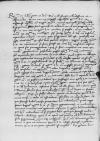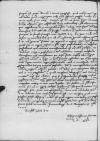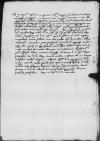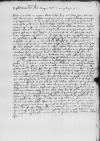Rem acu me tetigisse cognoscet Reverendissima Domination Vestra ex responso capitulari ad ⌊regiam maiestatem⌋, cuius exemplum praesentibus indidi. Quae quoniam fatis fatis agentibus ita ceciderunt ac ea via pergendum iam est, in rem erit, ut Reverendissima Dominatio Vestra comitem se praestet ac ita moderetur omnia, ut ⌊maiestas regia⌋ intelligat ipsi quoque Reverendissimae Dominationi Vestrae non displicere capitulare iudicium ac rem extra suspicionem doli esse, quod ipsum etiam ipsa eius maiestas ex istis litteris poterit accipere, urgeat quoque Reverendissima Dominatio Vestra, ut nominationes, si fieri potest, ... illegible⌈...... illegible⌉ ante diem constitutum adsint, ne opus sit prorogatione, quae si fiet, impediet, ne ante ⌊conventum⌋ Grudentinum postulatio possit Reverendissimae Dominationi Vestrae intimari, sed reicienda sit intimatio ad eius reditum, quod nescio, an conducet propter expeditiones ⌊Romae⌋ faciendas, quibus adesse oportet consensum Reverendissimae Dominationis Vestrae in postulationem de se factam, nec conveniet rem in longum trahi. Propterea laudarem, si Reverendissima Dominatio Vestra iam misisset ⌊Cracoviam⌋, ut proximis litteris consului, nam ⌊regiam maiestatem⌋ ultra ⌊Leopolim⌋ iam progressam audio, quod negotiis his moram longiorem pariet. Modo nominationes iusto tempore adveniant, res Vestrae Reverendissimae Dominationis in tuto erunt. Hod Heri in ⌊capitulo⌋ dominus ⌊praepositus⌋ noster, ne postremus haberetur, qui suffragio rem Reverendissimae Dominationis Vestrae iuvaret,
imo ut (si diis placet) primipilum ageret, votum suum pro Reverendissima Dominatione Vestra iam declaravit, testatus se totum ab illa stare. Sed interim apud dominum ⌊decanum⌋ sedulus fuit ac cubicularium istum ad eum duxit in secretum colloquium. Nisi me fallit iudicium, opinor non adversus Reverendissimam Dominationem Vestram, cuius causam in vado iam esse vident, sed contra me aliquid strui, de quo fortasse dabitur occasio percontari hunc cubicularium, quod rogo facere dignetur Reverendissima Dominatio Vestra, si aderit opportunitas, ne malevolorum conatus incautos nos opprimant, ostentat dominus ⌊praepositus⌋ domini ⌊vicecancellarii⌋ per hunc cubicularium ad se scriptas litteras, apud quem fortasse valet aliquid.
Arbitror Reverendissimae Dominationis Vestrae apud nos praesentiam ad diem electionis fore supervacaneam minusque necessariam, quam etiam ⌊conventus ⌊Grudentinus⌋⌋, a quo non conveniet Reverendissimam Dominationem Vestram abesse, fortasse impediet.
Ex ⌊Gedano⌋ huc  AAWO, AB, D. 2, f. 57v scriptum est ⌊papam Paulum⌋ e vivis excessisse, quod, etiam si verum esset, non video, quid magnopere rebus nostris officere possit, modo hic et in aula sint ratae. Certatum est hic non parum super advocatis dominorum absentium pro absolutione huius cubicularii, sed obtinuimus, qui negabamus id in rempublicam fore, alioquin ante sextum diem non dimissus hinc non ille non fuisset. Nullus iam apud me reliquus est hidden by binding⌈[t]t hidden by binding⌉ scrupus de fausto successu rerum Reverendissimae Dominationis Vestrae. Ne vero mihi etiam desim in curandis his, quae ad rem institutam pertinent, obsecro, Reverendissima Dominatio Vestra non gravetur scitari ex amicis in ⌊Regno⌋ earum rerum peritis hidden by binding⌈[s]s hidden by binding⌉, quis sit in regno usus in simili casu postulationis, cum videlicet postulatus vel nominatus transferendus est ad aliam ecclesiam, an videlicet mox a postulatione vel nominatione, antequam constet de
admissione vel translatione per papam facta, capitulum alium eligat episcopum vel nominatum a rege in locum prioris assumat, ut cum hoc resciero, mihi liceat imitari regni observantiam vel in cunctando, vel in prosequendis his, quae res praesens postulat. Nam, si una expeditione ambarum hidden by binding⌈[rum]rum hidden by binding⌉
ecclesiarum negotium absolvi poterit, non video, qua occasione consensus
vel a me praestabitur (quod necessarium utique est), vel ⌊Romam⌋ mittetur, nisi fiat electio, quae si suspendenda est usque in finem expeditionis Dominationis Vestrae Reverendissimae vel illius translationis, plurimum intercedet morae et erit cura duplex. Ni fallor, in simili casu omnia simul in ⌊Regni⌋ ecclesiis expediuntur, sed qua id ratione aut processu fiat, scire erit operaepretium. Hanc curam, non dubito, Reverendissimam Dominationem Vestram libenter mea causam suscepturam esse, cui vicissim, quod a me praestari potest obsequii, nihil est, quod negare aut velim aut possim hidden by binding⌈[m]m hidden by binding⌉.
AAWO, AB, D. 2, f. 57v scriptum est ⌊papam Paulum⌋ e vivis excessisse, quod, etiam si verum esset, non video, quid magnopere rebus nostris officere possit, modo hic et in aula sint ratae. Certatum est hic non parum super advocatis dominorum absentium pro absolutione huius cubicularii, sed obtinuimus, qui negabamus id in rempublicam fore, alioquin ante sextum diem non dimissus hinc non ille non fuisset. Nullus iam apud me reliquus est hidden by binding⌈[t]t hidden by binding⌉ scrupus de fausto successu rerum Reverendissimae Dominationis Vestrae. Ne vero mihi etiam desim in curandis his, quae ad rem institutam pertinent, obsecro, Reverendissima Dominatio Vestra non gravetur scitari ex amicis in ⌊Regno⌋ earum rerum peritis hidden by binding⌈[s]s hidden by binding⌉, quis sit in regno usus in simili casu postulationis, cum videlicet postulatus vel nominatus transferendus est ad aliam ecclesiam, an videlicet mox a postulatione vel nominatione, antequam constet de
admissione vel translatione per papam facta, capitulum alium eligat episcopum vel nominatum a rege in locum prioris assumat, ut cum hoc resciero, mihi liceat imitari regni observantiam vel in cunctando, vel in prosequendis his, quae res praesens postulat. Nam, si una expeditione ambarum hidden by binding⌈[rum]rum hidden by binding⌉
ecclesiarum negotium absolvi poterit, non video, qua occasione consensus
vel a me praestabitur (quod necessarium utique est), vel ⌊Romam⌋ mittetur, nisi fiat electio, quae si suspendenda est usque in finem expeditionis Dominationis Vestrae Reverendissimae vel illius translationis, plurimum intercedet morae et erit cura duplex. Ni fallor, in simili casu omnia simul in ⌊Regni⌋ ecclesiis expediuntur, sed qua id ratione aut processu fiat, scire erit operaepretium. Hanc curam, non dubito, Reverendissimam Dominationem Vestram libenter mea causam suscepturam esse, cui vicissim, quod a me praestari potest obsequii, nihil est, quod negare aut velim aut possim hidden by binding⌈[m]m hidden by binding⌉.
Commendo me gratiae et amori eiusdem Reverendissimae Dominationis Vestrae. Quam Dominus Deus servet felicem et iucundam.
 AAWO, AB, D. 2, f. 57v scriptum est
AAWO, AB, D. 2, f. 57v scriptum est 



